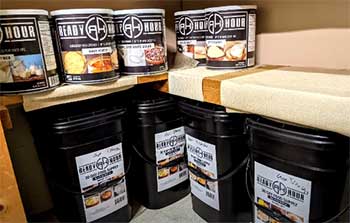Winter’s bite can be brutal, but with the LF Bros diesel heater, you’re not just surviving the cold—you’re thriving in it. I’ve tested this compact powerhouse through freezing nights, and it’s a game-changer for anyone needing reliable, efficient heat.
Whether you’re camping in an RV, warming a garage, or cozying up an off-grid cabin, this heater delivers. Its sleek design, low fuel consumption, and versatile power options make it a must-have.
Trust me, if you want to stay toasty without breaking the bank, the LF Bros diesel heater is your answer.
My Experience With The LF Bros Diesel Heater
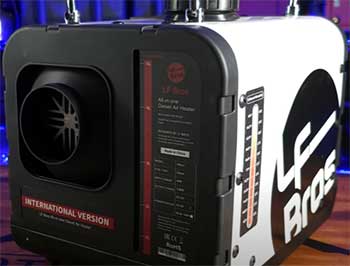
Picture this: it’s a bone-chilling January night in the Midwest, the kind where your breath hangs in the air even inside.
I’m in my uninsulated 39-foot trailer, and the LF Bros 5KW diesel heater is my only defense against the 10°F cold outside.
I set it up on the deck, ran the heat tube through a window, and flipped it on.
Within minutes, warm air flooded the space, transforming it into a cozy 75°F haven. I was skeptical about a “cheap” diesel heater at first, but this thing proved me wrong.
I opted for the N2 model, drawn by its all-in-one design and promise of easy setup. The instruction booklet was clear, and a QR code linked to a video tutorial that made installation a breeze, even for someone like me who’s not exactly a DIY guru.
The remote control, pre-paired and effective up to 100 feet, let me adjust settings without leaving my warm bed. I ran it on medium overnight, and the 5L tank lasted about nine hours, keeping the trailer at a steady 60°F.
The heat was dry, so no annoying condensation dripped down the walls—a huge win for my setup.
What stood out was the quiet operation. The fuel pump’s faint ticking didn’t bother me, though I’ve heard some folks find it noticeable. The heater’s versatility also impressed me; I powered it with a 12V battery for off-grid use but loved that it came with a 110V transformer for when I’m near an outlet.
One trick I learned: wrapping the heat tube in aluminum foil when it’s below freezing boosted the warmth significantly. This heater isn’t just functional—it’s a reliable companion for anyone braving the cold.
Pros of The LF Bros Diesel Heater
- Exceptional Heating Performance
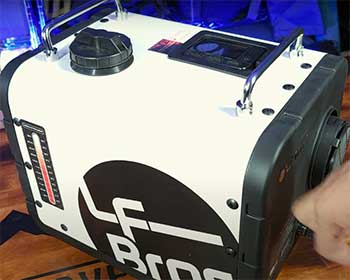
The LF Bros 5KW diesel heater pumps out 4,700 to 17,000 BTU, turning frigid spaces into warm retreats fast.
I’ve used it in my trailer and a friend’s garage, and it consistently delivers.
Even in subzero temperatures, it maintains a comfortable indoor climate, whether you’re in a camper or a shop.
The ability to heat large spaces, like a bus or a 6-meter caravan, makes it versatile for various setups.
- Fuel Efficiency That Saves You Money
Fuel consumption is a standout feature, ranging from 0.18 to 0.53 liters per hour. In my experience, a full 5L tank lasted over 30 hours on the lowest setting, making it incredibly cost-effective.
Compared to running electric heaters or idling a vehicle for heat, this heater sips diesel, keeping your wallet happy while keeping you warm.
- Versatile Power Options
This heater’s flexibility is a lifesaver. It supports 12V, 24V, and includes a 110V transformer, so you can plug it into a standard outlet or run it off a battery. I’ve used it both ways—12V for off-grid camping and 110V in my garage.
No need for extra parts or complicated setups; it’s ready to go wherever you are.
- User-Friendly Design and Controls
Setting up the LF Bros heater is straightforward, thanks to the detailed manual and QR code tutorials. The LCD screen shows real-time status, and the pre-paired remote lets you tweak settings from afar.
I love the 24-hour timer, which lets me schedule heating to match my routine, saving fuel and effort.
- Leak-Proof Fuel Tank
The internal-thread fuel cap, similar to a car’s gas cap, prevents spills even on bumpy roads. I’ve driven with this heater in my vehicle, and not a drop leaked.
This design gives me peace of mind, especially when overlanding or moving between campsites.
- Quiet Operation with Minimal Noise
The heater’s silent oil pump and baffled muffler keep noise low. I barely notice it running, which is a relief compared to other diesel heaters I’ve tried that sounded like a small engine.
It’s quiet enough to run overnight without disturbing sleep.
Cons of The LF Bros Diesel Heater
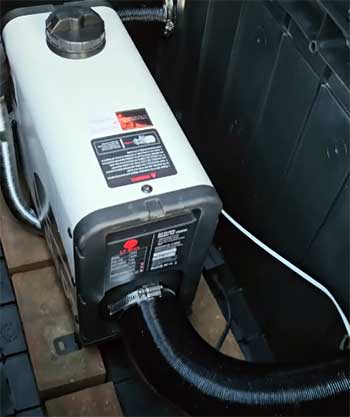
- Lightweight Exhaust System: The exhaust system, while functional, feels flimsier than the rest of the unit. During setup, I noticed the exhaust pipe and muffler were thin and required careful handling to avoid dents. It gets the job done, but a sturdier exhaust would inspire more confidence, especially for long-term use in rugged conditions.
- Fuel Pump Ticking: While I didn’t mind the fuel pump’s faint ticking, some friends at camp found it noticeable, especially in quiet settings. It’s not loud, but if you’re sensitive to repetitive sounds, it might bug you. Adding sound-deadening material around the pump could help, but it’s an extra step.
- Limited Local Support: LF Bros offers solid products, but their customer support is primarily email-based, with no local service centers in many areas. When a friend had a fuel pump issue, getting a replacement was straightforward but took time. If you’re not comfortable troubleshooting, this could be a hassle compared to brands with extensive dealer networks.
- Temperature Regulation Issues in Larger Spaces: In larger or poorly insulated spaces, the heater struggles to maintain a precise temperature. I noticed this in an uninsulated cabin where it kept heating beyond my set point. It’s designed for smaller spaces like vehicle cabs, so in bigger setups, you might need to manually adjust settings to avoid overheating.
Maintenance Tips For Your LF Bros Diesel Heater
- Regular Air Filter Cleaning: To keep your heater running smoothly, clean or replace the air filter every 1,000 hours of use. I check mine monthly during heavy use, as dust and debris can clog it, reducing efficiency. A quick rinse with soapy water and thorough drying does the trick, but keep a spare filter handy for quick swaps.
- Inspect and Tighten Connections: Loose connections can cause performance issues or safety hazards. I make it a habit to inspect wiring and fuel lines every few weeks, especially after moving the heater. A quick once-over with a screwdriver ensures everything’s secure, preventing unexpected shutdowns or leaks.
- Monitor Fuel Quality and Levels: Using clean, high-quality diesel is crucial to avoid carbon buildup in the combustion chamber. I stick to fresh diesel and check the 5L tank regularly to avoid running dry, which can damage the pump. If you’re mixing with kerosene, as some do to reduce carbon, ensure it’s a small ratio to maintain performance.
- Clean the Combustion Chamber: Carbon deposits can build up over time, especially if you run the heater on low settings for extended periods. Every few months, I run mine at maximum power for 10 minutes before shutting it down. This burns off residue, keeping the chamber clean. If you notice smoky exhaust, it’s a sign to check this.
- Protect the Exhaust System: The exhaust pipe gets extremely hot, so route it carefully to avoid contact with flammable materials. I invested in a metal exhaust port for my cabin setup to prevent heat transfer to wooden walls. Regularly check the muffler and pipe for corrosion or damage, especially if you’re in wet or salty environments.
- Store Properly in Off-Season: When winter ends, I store my heater in its foam-padded box to prevent scratches or damage. Drain the fuel tank and run the heater briefly to clear residual diesel from the lines. Store it in a dry place to avoid rust, and you’ll have a like-new unit next season.
Comparison of LF Bros Diesel Heater With Other Brands
When choosing a diesel heater, you want one that fits your needs without breaking the bank or complicating your setup. I’ve compared the LF Bros 5KW diesel heater with two popular competitors—HCalory and Webasto—to help you decide which is the best fit for your winter adventures.
Each brand has its strengths, but let’s break it down in a head-to-head style to see how they stack up in performance, cost, ease of use, and durability.
- LF Bros Vs. HCalory: Affordability Meets Quality
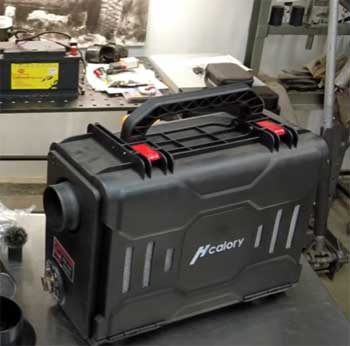
I’ve used both the LF Bros N2 and HCalory’s AC-01 diesel heater during camping trips, and the differences are clear.
The LF Bros, priced around $300-$600, offers a polished all-in-one package that’s ready to go out of the box.
Its 4,700-17,000 BTU output heats my 39-foot trailer effortlessly, and the fuel consumption (0.18-0.53L/h) stretches a 5L tank for up to 30 hours on low.
The silent oil pump and baffled muffler keep it whisper-quiet, and the leak-proof fuel cap ensures no spills on bumpy roads.
The included 110V transformer and 12V/24V compatibility make it versatile for off-grid or plugged-in use.
HCalory’s AC-01, at around $250, is a budget-friendly alternative, but it feels less refined. During a high-altitude camping trip, the HCalory struggled above 7,000 feet due to its lack of altitude adjustment, while the LF Bros performed flawlessly.
The HCalory’s fuel pump was noticeably louder, and its hoses felt flimsy, requiring me to consider upgrades like a better muffler to match LF Bros’ quiet operation. While HCalory heats well for the price, its inconsistent build quality and less secure fuel tank make LF Bros a better choice for reliability without a huge price jump.
- LF Bros Vs. Webasto: Value vs. Premium Build
Webasto is the gold standard for diesel heaters, and I’ve seen their Air Top 2000 STC in action in a friend’s RV. Priced at $2,000 or more, Webasto delivers unmatched durability, with heavy-duty components and a two-year or 2,000-hour warranty.
Its 2KW output is slightly lower than LF Bros’ 5KW, but it heats with precision and is built for extreme conditions, like subarctic winters. The extensive dealer network means repairs are quick, and spare parts are widely available, which is a big plus for long-term users.
In contrast, the LF Bros heater offers similar heating performance for a fraction of the cost. In my trailer, the LF Bros maintained a cozy 75°F in 10°F weather, rivaling Webasto’s consistency. However, its exhaust system feels lighter and less robust than Webasto’s industrial-grade setup.
LF Bros’ customer support is email-based and slower, unlike Webasto’s accessible service centers. If you’re a casual user like me, the LF Bros provides incredible value, but if you need bulletproof reliability for constant use in harsh environments, Webasto’s premium build might justify the steep price.
- LF Bros Vs.VEVOR Diesel Heaters
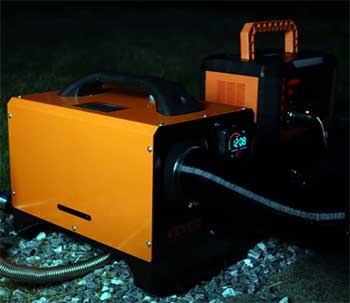
VEVOR diesel heaters, often priced under $200, are the budget king, but my experience with one in a friend’s garage showed their limitations.
The LF Bros N2 delivers consistent heat, maintaining 75°F in my trailer even when it’s 10°F outside. Its sturdy design, quiet operation, and secure fuel tank make it a dependable choice.
The LCD screen and pre-paired remote (with a 100-foot range) add convenience, and the foam-padded packaging ensures it arrives undamaged.
In contrast, the VEVOR heater I tested felt like a gamble.
It heated well initially but developed carbon buildup after a season, requiring frequent cleaning. Its fuel tank wasn’t as secure, leaking slightly during transport, unlike LF Bros’ spill-proof cap.
The VEVOR’s exhaust pipe was thin and prone to dents, and its noise level was higher, disrupting quiet nights. Some VEVOR units last years, but others fail early, making LF Bros’ slightly higher price worth it for consistent quality and fewer headaches.
Frequently Asked Questions (FAQ)
LF Bros diesel heaters are manufactured by Heilongjiang LF Bros Technology Company, Ltd., a Chinese company founded in 2003. They specialize in parking heaters and engine heaters, holding multiple patents and certifications like CE, RoHS, and EAC. Their products are exported to over 20 countries, focusing on quality and affordability for outdoor and vehicle heating needs.
The LF Bros 5KW diesel heater uses minimal electrical power, primarily for the control system and initial preheating. It draws about 15 amps at startup (roughly 180-360 watts at 12V or 24V) but settles to a low 10-20 watts during operation, making it efficient for battery-powered setups.
The choice between a 5KW and 8KW diesel heater depends on your space. The 5KW LF Bros model (4,700-17,000 BTU) is ideal for smaller spaces like RVs or cabins, offering ample heat with lower fuel use. The 8KW version suits larger areas but may soot up if run on low settings in small spaces, requiring more maintenance. For most users, 5KW is sufficient and more economical.
The LF Bros N2 diesel heater consumes 0.18 to 0.53 liters per hour, depending on the power setting. In my experience, running it on low uses about 0.18L/h, allowing a 5L tank to last over 30 hours, while higher settings closer to 0.53L/h provide intense heat for larger spaces but deplete the tank faster.
Conclusion: Stay Warm With LF Bros
If you’re tired of shivering through winter adventures or chilly nights in your garage, the LF Bros diesel heater is your ticket to warmth. Its powerful heating, fuel efficiency, and easy setup make it a no-brainer for campers, overlanders, or anyone needing reliable heat.
Despite minor flaws like a lightweight exhaust, its value and performance outshine many competitors. Grab an LF Bros heater, follow the maintenance tips, and you’ll be cozy all season long. Don’t let the cold win—make this heater your winter essential.

